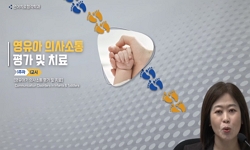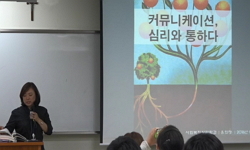본 연구는 지적장애인의 의사소통에 대하여 부모와 시설종사자의 경험을 이해하고, 그들이 이해하는 지적장애인의 의사소통에 대한 경험의 본질을 탐구하는데 목적이 있다. 인간은 항상 ...
http://chineseinput.net/에서 pinyin(병음)방식으로 중국어를 변환할 수 있습니다.
변환된 중국어를 복사하여 사용하시면 됩니다.
- 中文 을 입력하시려면 zhongwen을 입력하시고 space를누르시면됩니다.
- 北京 을 입력하시려면 beijing을 입력하시고 space를 누르시면 됩니다.
https://www.riss.kr/link?id=T12512526
- 저자
-
발행사항
서울 : 덕성여자대학교 일반대학원, 2011
-
학위논문사항
학위논문(석사) -- 덕성여자대학교 일반대학원 , 사회복지학과 , 2011. 8
-
발행연도
2011
-
작성언어
한국어
- 주제어
-
발행국(도시)
서울
-
형태사항
vi, 153 p. ; 26cm
- 소장기관
-
0
상세조회 -
0
다운로드
부가정보
국문 초록 (Abstract)
본 연구는 지적장애인의 의사소통에 대하여 부모와 시설종사자의 경험을 이해하고, 그들이 이해하는 지적장애인의 의사소통에 대한 경험의 본질을 탐구하는데 목적이 있다.
인간은 항상 다른 사람들과 관계를 맺으며 사회의 한 구성원으로서 살아가고 있으며, 이러한 관계를 맺는데 영향을 주는 것들 중 하나로 의사소통을 들 수 있다. 하지만 지적장애인의 경우 이러한 의사소통 맥락을 적절하게 사용하는 측면에 있어 어려움을 가지고 있다. 이러한 어려움들은 넓게는 사회에서 기대하는 역할과 책임, 그 안에서 맺게 되는 다양한 관계에 영향을 미친다. 따라서 지적장애인의 의사소통에 대하여 제일 가까운 부모와 시설종사자의 경험을 듣고, 사회에 지적장애인들의 의사소통에 대해 조명해줄 필요성을 가진다.
연구의 목적을 달성하기 위해 연구질문 ‘지적장애인의 의사소통에 대한 시설종사자와 어머니의 경험적 어려움은 어떠한가?’ 와 하위연구질문 3가지 ‘시설종사자와 어머니는 시설 서비스를 이용하는 지적장애아동과의 의사소통과정에서 겪는 어려움을 어떻게 이해하는가?’, ‘시설종사자와 어머니는 그러한 어려움의 원인에 대해 어떻게 이해하고 있는가?’, ‘시설종사자와 어머니는 시설 서비스를 받는 지적장애아동의 의사소통을 둘러싼 사회적 지원, 기대에 대해 어떻게 이해하는가?’ 를 놓고 경험의 본질을 분석한 결과 ‘어머니의 의사소통에 대한 경험 : 보호적(의무적)’, ‘시설종사자의 의사소통에 대한 경험 : 일방적,(폐쇄적)’, ‘’지적장애‘라는 손상을 가진 내 아이’, ‘책임져야하는 존재, 책임지지 못하는 존재’, ‘환경적 기회부족’, ‘의사소통을 꺼려하는 사회적 인식’, ‘배움이 변화의 시작’, ‘상처받지 않아도 되는 사회의 전이’, ‘맞춤식 시설, P/G구현’, ‘보편적 의사소통에 대한 인식 개선’으로 나타났다. 이러한 주제묶음들은 결국 지적장애인과의 의사소통이 필요하다고 느끼고 함께 소통하고 싶지만, 사회적 인식, 여건이 여의치 않아 제한받고 있는 지금의 모습이라는 하나의 현상으로 정리해 볼 수 있다.
또한, 연구결과를 토대로 연구의 이론적, 실천적 함의점을 제시할 수 있다. 첫째, 이론적 함의로는 기존의 연구들에 비해 지적장애인과의 의사소통에 대한 부모와 시설종사자들의 경험적 어려움의 본질을 파악하고 의미를 밝히고 있어 현상을 더 깊이 볼 수 있는 계기를 마련했다고 할 수 있다. 둘째, 실천적 함의로는 지적장애인의 의사소통에 대한 경험적 어려움의 원인을 다양한 장애관련 패러다임에 적용시켜보는 시도를 함으로써, 사회복지의 실천적 개입 전략을 모색할 수 있는 토대를 마련하였다는데 의미가 있다.
본 연구의 한계 및 제언은 다음과 같다.
첫째, 본 연구는 지적장애인의 의사소통의 경험을 듣기 위해 대상자 선정 장소를 생활시설과 단기보호시설로 제한하여 선정하였다. 그로 인해 본 연구결과가 모든 종별의 기관을 이용하는 지적장애인의 시설종사자와 부모의 경험에 관련한 연구결과로서는 한계가 있다는 점이다. 앞으로 나머지 장애인복지관련기관에서도 시설종사자와 부모의 의사소통의 경험적 어려움을 듣는 연구가 이루어져야 할 것이다. 둘째, 지적장애인 당사자의 면접이 아닌 부모와 시설종사자의 면접으로서, 정작 당사자의 의사소통에 관한 경험적 어려움을 들을 수 없다는 한계점이 있다. 따라서 앞으로는 당사자의 주관적 인식 중심의 연구가 함께 이루어져야 할 것이다.
다국어 초록 (Multilingual Abstract)
This study aims to examine communication of the intellectually disabled to understand the experiences of their parents and caretaker workers in support facilities and look into the essence of their experiences in communication with the intellectually ...
This study aims to examine communication of the intellectually disabled to understand the experiences of their parents and caretaker workers in support facilities and look into the essence of their experiences in communication with the intellectually disabled people.
Human beings live their lives as a member of a society, building relations with other people, and communication is one of the important factors on building such relations. However, the intellectually disabled have difficulty in communicating with others. Such challenges have an impact on their roles and responsibilities in the society and various social relations with others. Therefore, it is necessary to examine and share the experiences of parents and caretakers in communicating with the intellectually disabled to put a limelight on communication of these individuals with disabilities.
In order to achieve the goal of the study, one main question and three sub-questions were asked as follows: “What are the challenges mothers and workers of the intellectually disabled face in communication with them?” “What do mothers and workers of the intellectually disabled children think that the challenges are in communicating with them?” “What do mothers and workers think that the causes of the challenges in communication are?” “How do mothers and workers understand the social support and expectations towards the communications of the intellectually disabled?”
The answers to the questions were as follows: mothers’ experience toward communication with their children was described as protective (obligated) while workers’ experience was expressed as unilateral and exclusive. Mothers and workers also answered to the three other questions as follows: “My child damaged with intellectual disability” “Someone I should take responsibility for/ someone I cannot take responsibility for” “lack of opportunities in the social environment” “social perception against communication with the intellectually disabled” “learning starts changes” “transfer of a society without being hurt” "customized facilities and implementation of P/G” and “promoting public awareness of universal communication.” These keywords show that mothers and workers feel the need to communicate with the intellectually disabled, but they face limitations due to the negative social perception and environment.
In addition, the research outcome gives us theoretical and practical implications. First, theoretical implication is that the study serves as an opportunity to examine and look further into the essence of the challenges mothers and workers of the intellectually disabled experience. Second, the practical implication is that the study provides an opportunity to examine the practical intervention strategy of social welfare by applying the causes of the challenges to various disability paradigms.
The limitations and suggestions of this study are as follows:
First, this study was conducted on those in residential facilities and short-term facilities for the disabled in collecting data on communication with the intellectually disabled. This means that the study has its own limits to be used for parents and workers of all types of facilities for the disabled people. It is hoped that more research on disability and communication would be done with other disability facilities as well. Second, the study was done by interviewing parents and workers of the intellectually disabled, not the disabled people themselves, which creates limitations that the study was not about the challenges the disabled people themselves face. Therefore, it is necessary to conduct further research on the communication of the intellectually disabled from their own perspectives.
목차 (Table of Contents)
- 목 차
- 제 1 장 서론 1
- 제 1 절 연구의 필요성 1
- 목 차
- 제 1 장 서론 1
- 제 1 절 연구의 필요성 1
- 제 2 절 연구 목적 4
- 제 2 장 이론적 배경 5
- 제 1 절 장애를 바라보는 패러다임 6
- 제 2 절 장애의 사회적 모델 10
- 1. 등장배경 10
- 2. 사회적 모델의 개념 13
- 3. 손상과 사회적 모델의 관계 14
- 제 3 절 지적장애아동의 삶 20
- 1. 지적장애의 개념 20
- 2. 지적장애아동과 욕구 22
- 1) 지적장애아동의 현황과 특성 22
- 2) 지적장애아동의 가족욕구 25
- 3. 지적장애아동의 사회적 지원 27
- 1) 법 제도적 측면 27
- 2) 프로그램 측면 30
- 제 4 절 지적장애아동과 의사소통 32
- 1. 의사소통의 개념 32
- 2. 지적장애아동의 의사소통 33
- 제 3 장 연구방법 35
- 제 1 절 질적연구의 필요성 35
- 제 2 절 질적 연구로서의 현상학 37
- 1. 현상학의 개념 37
- 2. 질적연구의 선행연구 고찰 40
- 제 3 절 연구설계 42
- 1. 연구문제 42
- 1) 연구 질문 42
- 2) 하위 연구 질문 42
- 2. 조사대상 선정방법 43
- 3. 자료 수집 방법 46
- 4. 자료 분석 방법 49
- 5. 연구자의 준비 52
- 6. 질적연구에 있어서의 윤리문제 53
- 7. 연구의 신뢰성 55
- 제 4 장 연구 결과 56
- 제 1 절 연구 사례와 연구참여자 56
- 제 2 절 지적장애인과의 의사소통에 관한 경험 58
- 1. 지적장애아동과의 의사소통의 경험의 이해 61
- 1) 어머니가 경험한 아이와의 힘겨운 의사소통 61
- : 보호적(의무적)의사소통 61
- 2) 시설종사자의 의사소통에 대한 경험 : 일방적(폐쇄적) 78
- 2. 지적장애아동과의 의사소통에 대한 경험의 원인 87
- 1) ‘지적장애’라는 손상을 가진 내 아이 87
- 2) 책임져야 하는 존재, 책임지지 못하는 존재 89
- 3) 환경적 기회 부족 92
- 4) 의사소통을 꺼려하는 사회적 인식 97
- 3. 지적장애아동과의 의사소통에 대한 기대 101
- 1) 배움이 변화의 시작 101
- 2) 상처받지 않아도 되는 사회로의 전이 104
- 3) 맞춤식 시설, P/G 구현 108
- 4) 보편적 의사소통에 대한 인식 개선 112
- 제 5 장 결론 116
- 제 1 절 연구결과 요약 116
- 제 2 절 논의 124
- 제 3 절 함의 및 한계점 128
- 1. 이론적 함의 128
- 2. 실천적 함의 129
- 3. 한계 및 제언 130
- 참고문헌 131
- 부록 143
- ABSTRACT 151












